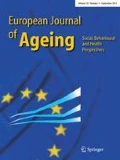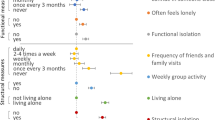Abstract
The purpose of the study was to examine the association between the centrality of the grandparent’s role and psychological well-being in the population of European grandparents, aged 50 and older. The study was a secondary analysis of data gathered in the first wave of the Survey of Health, Ageing and Retirement in Europe. The sample included grandparents who looked after their grandchildren without the presence of the parents (n = 3,888). Respondents’ scores on the Center for Epidemiological Studies Depression Scale were regressed on the frequency of contact with grandchildren, beliefs and attitudes about grandparenting and grandparent-focused role occupancy, and on a composite measure of grandparent role centrality, controlling for age, gender, education, household income, physical status, and country. The findings negated the hypothesized positive association between grandparent role centrality and psychological well-being. Only one of the three indices of interest—grandparent-focused role occupancy—was related to the psychological well-being outcome when background and health variables were taken into account. The study refutes the central claim of role theory according to which salient roles are more beneficial to the psychological well-being of the individual than are other roles, especially in old age. It also questions the theoretical framework of grandparent role meaning that is commonly cited in the literature.
Similar content being viewed by others
References
Adelmann PK (1994) Multiple roles and psychological well-being in a national sample of older adults. J Gerontol 49:277–285
Ahrens CJ, Ryff CD (2006) Multiple roles and well-being: sociodemographic and psychological moderators. Sex Roles 55:801–815
Baydar N, Brooks-Gunn J (1998) Profiles of grandmothers who help care for their grandchildren in the United States. Fam Relat 47(4):385–393
Burnette D (1999) Social relationships of Latino grandparent caregivers: a role theory perspective. Gerontologist 39(1):49–58
Cornoni-Huntley JC, Foley DF, White LR, Suzman R, Berkman LF, Evans DA, Wallace RB (1985) Epidemiology of disability in the oldest old: methodological issues and preliminary findings. Health Soc 63:350–376
De Luca G, Peracchi F (2005) Survey participation in the first wave of SHARE. In: Börsch-Supan A, Jürges H (eds) The survey of health, ageing and retirement in Europe: methodology. MEA, Mannheim, pp 88–104
Drew LM, Silverstein M (2004) Inter-generational role investments of great-grandparents: consequences for psychological well-being. Aging Soc 24:95–111
Drew LM, Silverstein M (2007) Grandparents’ well-being after loss of contact with their grandchildren. J Fam Psychol 21(3):372–379
Ganong GH, Coleman M (1998) An exploratory study of grandparents’ and stepgrandparents’ financial obligations to grandchildren and stepgrandchildren. J Soc Pers Relat 15(1):39–58
Gauthier A (2002) The role of grandparents. Curr Sociol 50(2):295–307
Hank K, Buber I (2009) Grandparents caring for their grandchildren: findings from the 2004 survey in health, aging and retirement in Europe. J Fam Issues 30(1):53–73
Hayslip B, Henderson CE, Shore RJ (2003) The structure of grandparental role meaning. J Adult Dev 10(1):1–11
Jendrek MP (1994) Grandparents who parent their children: effects on lifestyle. J Marriage Fam 55(3):609–621
Kaufman G, Elder GH (2003) Grandparenting and age identity. J Aging Stud 17(3):269–284
Kivnick HQ (1983) Dimensions of grandparenthood meaning: deductive conceptualization and empirical derivation. J Pers Soc Psychol 44(5):1056–1068
Klevmarken AN, Swensson B, Hesselius P (2005) The SHARE sampling procedures and calibrated design weights. In: Börsch-Supan A, Jürges H (eds) The survey of health, ageing and retirement in Europe: methodology. MEA, Mannheim, pp 28–69
Knesebeck OV, Wahrendorf M, Hyde M, Siegrist J (2007) Socio-economic position and quality of life among older people in 10 European countries: results of the SHARE study. Aging Soc 27(2):269–284
Martire LM, Stephens MA, Townsend LA (2000) Centrality of women’s multiple roles: beneficial and detrimental consequences for psychological well-being. Psychol Aging 15(1):148–156
Nordenmark M (2004) Multiple social roles and well-being. A longitudinal test of the role stress theory and the role expansion theory. Acta Sociologica 47(2):115–126
Perrone KM, Civiletto CL (2004) The impact of life role salience of life satisfaction. J Employ Counsel 41(3):105–116
Peterson CC (1999) Grandfathers’ and grandmothers’ satisfaction with the grandparenting role: seeking new answers to old questions. Int J Aging Hum Dev 49(1):61–78
Radloff LS (1977) The CES-D scale: a self-report depression scale for research in the general population. Appl Psychol Meas 1:385–401
Reid J, Hardy M (1999) Multiple roles and well-being among midlife women: testing roles strain and role enhancement theories. J Gerontol 54(6):329–338
Reitzes DC, Mutran EJ (2002) Self-concept as the organization of roles: importance, centrality, and balance. Socio Q 43(4):647–667
Reitzes DC, Mutran EJ (2004) Grandparenthood: factors influencing frequency of grandparent–grandchildren contact and grandparent role satisfaction. J Gerontol 59B(1):9–16
Rozario PA, Morrow-Howell N, Hinterlong JE (2004) Role enhancement or role strain: assessing the impact of multiple productive roles on older caregiver well-being. Res Aging 26(4):413–428
Silverstein M, Marenco A (2001) How American enact the grandparent role across the family life course. J Fam Issues 22(4):493–522
Thiele DM, Whelan TA (2008) The relationship between grandparent satisfaction, meaning and generativity. Int J Aging Hum Dev 66(1):21–48
Zeltzer-Zubida A, Spalter T (2008) Subjective well-being among 50+ year old Israelis. Soc Sec 76:269–290
Funding
SHARE data collection in wave was primarily funded by the European Commission through the fifth framework program (project QLK6-CT-2001-00360 in the thematic program Quality of Life), the National Institute on Aging (U01 AG09740-13S2, P01 AG005842, P01 AG08291, P30 AG12815, Y1-AG-4553-01, and OGHA 04-064), and other sources.
Author information
Authors and Affiliations
Corresponding author
Rights and permissions
About this article
Cite this article
Muller, Z., Litwin, H. Grandparenting and psychological well-being: how important is grandparent role centrality?. Eur J Ageing 8, 109–118 (2011). https://doi.org/10.1007/s10433-011-0185-5
Published:
Issue Date:
DOI: https://doi.org/10.1007/s10433-011-0185-5




